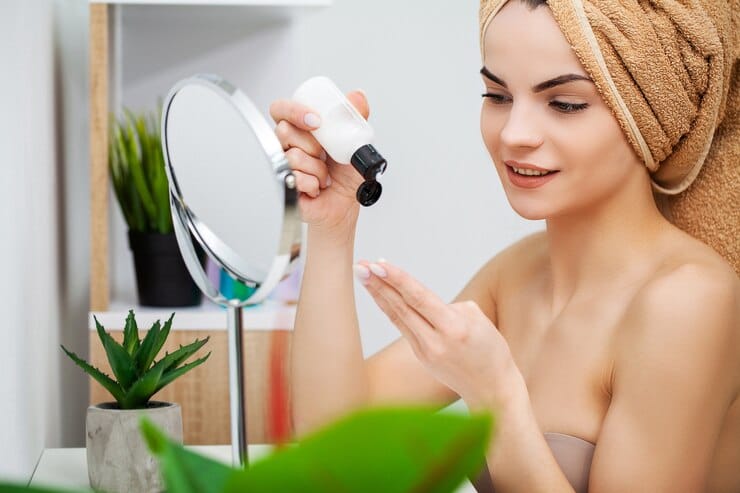Choosing the right skincare products can make all the difference in the world, especially if you have dry skin. Navigating the vast array of options available can be overwhelming, but understanding what your skin needs is the first step toward achieving a healthy, glowing complexion.
Understanding dry skin

What is dry skin?
Dry skin, also known as xerosis, is a common condition characterized by a lack of moisture in the skin’s outer layer. It can lead to rough patches, flakiness, and even cracking.
Common Causes of Dry Skin
Several factors can contribute to dry skin, including:
- Weather: Cold, dry air can strip moisture from the skin.
- Hot Showers: Long, hot showers can remove natural oils.
- Harsh Soaps: Soaps and detergents with strong chemicals can be drying.
- Aging: As we age, our skin produces less oil, leading to dryness.
Symptoms of dry skin
Symptoms can range from mild to severe and include:
- Tightness, especially after bathing
- Rough texture
- Itching
- Flaking or peeling
- Redness
Key Ingredients to Look For
When selecting skincare products for dry skin, certain ingredients are particularly beneficial.
Hyaluronic Acid
Hyaluronic acid is a powerhouse for hydration, capable of holding up to 1,000 times its weight in water. It helps plump the skin and reduce the appearance of fine lines.
Glycerin
Glycerin attracts moisture from the air into the skin’s outer layer, making it a great ingredient for maintaining hydration.
Ceramides
Ceramides help restore the skin’s barrier and retain moisture. They are essential for preventing water loss.
Natural oils (e.g., jojoba, argan)
Natural oils provide deep hydration and nourishment without clogging pores. Jojoba and argan oils are especially good for dry skin.
Shea Butter
Shea butter is rich in fatty acids and vitamins, making it an excellent moisturizer that also soothes and conditions the skin.
Ingredients to avoid

Certain ingredients can exacerbate dryness and should be avoided.
Alcohols
Alcohols can strip the skin of natural oils, leading to increased dryness and irritation.
Fragrances
Fragrances can cause irritation and allergic reactions, making them unsuitable for sensitive, dry skin.
Sulfates
Sulfates are harsh cleansing agents that can strip the skin of its natural moisture.
Parabens
Parabens are preservatives that can cause irritation and disrupt the skin’s natural balance.
Moisturizers for Dry Skin

Types of Moisturizers (Creams, Lotions, and Ointments)
- Creams: thinner and more hydrating, ideal for nighttime use.
- Lotions are lighter and suitable for daytime use.
- Ointments are highly moisturizing and great for extremely dry areas.
How to Apply Moisturizers
Apply moisturizers immediately after bathing to lock in moisture. Use gentle, upward strokes to avoid pulling the skin.
Recommended Moisturizers for Dry Skin
- CeraVe Moisturizing Cream
- Eucerin Advanced Repair Cream
- Neutrogena Hydro Boost Water Gel
Cleansers for Dry Skin

Importance of Gentle Cleansers
Harsh cleansers can strip the skin of its natural oils, leading to increased dryness. Opt for gentle, hydrating cleansers.
The Best Types of Cleansers for Dry Skin
- Cream cleansers
- Oil-based cleansers
- Micellar water
Recommended Cleansers
- La Roche-Posay Toleriane Hydrating Gentle Cleanser
- Cetaphil Gentle Skin Cleanser
- Neutrogena Ultra Gentle Hydrating Cleanser
Exfoliation and dry skin

Why Exfoliation is Important
Exfoliation helps remove dead skin cells, promoting cell turnover and allowing moisturizers to penetrate better.
The Best Exfoliants for Dry Skin
- Chemical exfoliants (AHAs and BHAs)
- Gentle physical exfoliants (e.g., sugar scrubs)
How Often to Exfoliate
Exfoliate 1-2 times per week to avoid over-exfoliation, which can worsen dryness.
Serums and treatments

Benefits of Using Serums
Serums deliver concentrated ingredients directly to the skin, providing targeted treatment for dryness.
The Best Serums for Dry Skin
- Hyaluronic acid serums
- Vitamin C serums
- Niacinamide serums
How to Incorporate Serums into Your Routine
Apply serums after cleansing and before moisturizing. Use gentle, tapping motions to enhance absorption.
Sunscreen for Dry Skin

The importance of sunscreen
Sunscreen protects against UV damage, which can exacerbate dryness and lead to premature aging.
Choosing the Right Sunscreen
Opt for sunscreens that are hydrating and free of alcohol. Look for broad-spectrum protection with SPF 30 or higher.
Recommended Sunscreens
- EltaMD UV Clear Broad-Spectrum SPF 46
- La Roche-Posay Anthelios Melt-in Milk Sunscreen SPF 100
- Neutrogena Hydro Boost Water Gel Lotion SPF 30
Night Care Routine

The Importance of Night Care
Nighttime is when the skin repairs itself, making it an ideal time for using nourishing products.
The Best Night Creams for Dry Skin
- CeraVe Skin Renewing Night Cream
- Eucerin Q10 Anti-Wrinkle Night Cream
- Olay Regenerist Night Recovery Cream
Tips for an Effective Night Routine
Cleanse, apply serums, and use a rich night cream. Consider using a humidifier to maintain moisture levels in the air.
DIY Skincare for Dry Skin

Benefits of DIY Skincare
DIY skincare can be customized to your specific needs and is often free of harsh chemicals.
Easy DIY recipes
- Honey and Oatmeal Mask: Mix honey and oatmeal for a hydrating and soothing mask.
- Avocado and Olive Oil Mask: Blend avocado and olive oil for deep nourishment.
- Coconut Oil and Sugar Scrub: Combine coconut oil and sugar for a gentle exfoliant.
Tips for Safe DIY Skincare
Always patch-test new recipes to ensure you don’t have an allergic reaction. Use fresh, high-quality ingredients.
Lifestyle Tips for Managing Dry Skin

Hydration and Diet
Drink plenty of water and eat foods rich in omega-3 fatty acids, like salmon and walnuts, to keep your skin hydrated from within.
Humidity and Environment
Use a humidifier in dry environments to add moisture to the air. Avoid long, hot showers and opt for lukewarm water instead.
Stress Management
Stress can affect your skin’s health. Practice relaxation techniques such as yoga, meditation, or deep breathing exercises.
Consulting a dermatologist

When to see a dermatologist
If over-the-counter products don’t improve your dry skin, it might be time to see a dermatologist for personalized advice.
What to Expect During a Visit
A dermatologist will examine your skin and may recommend prescription treatments or specific skincare routines.
Questions to Ask Your Dermatologist
- What are the best products for my skin type?
- Are there any specific ingredients I should avoid?
- How can I prevent dry skin from recurring?
Common Myths About Dry Skin

Debunking popular myths
- Myth: Drinking more water will solve dry skin. Fact: While hydration is important, topical moisturizers are essential.
- Myth: Oily skin cannot be dry. Fact: It’s possible to have a combination of oily and dry skin.
Facts About Dry Skin
- Dry skin can affect anyone at any age.
- It often requires a combination of lifestyle changes and skincare products.
Conclusion
Managing dry skin requires understanding your skin’s unique needs and choosing the right products. By focusing on hydration, gentle ingredients, and a consistent skincare routine, you can achieve healthy, glowing skin.
FAQs
What is the best moisturizer for dry skin?
The best moisturizer for dry skin often includes ingredients like hyaluronic acid, glycerin, and ceramides. CeraVe Moisturizing Cream is highly recommended.
How often should I exfoliate my dry skin?
For dry skin, exfoliating 1-2 times per week is sufficient. Over-exfoliating can lead to increased dryness and irritation.
Can oily skin become dry skin?
Yes, it’s possible for oily skin to become dry, especially if harsh products strip away natural oils or due to environmental factors.
Is it necessary to use a serum for dry skin?
Using a serum can be beneficial as it provides concentrated hydration and treatment, especially hyaluronic acid or vitamin C serums.
What are the best natural remedies for dry skin?
Natural remedies like honey masks, avocado and olive oil masks, and coconut oil scrubs can provide hydration and nourishment to dry skin.







